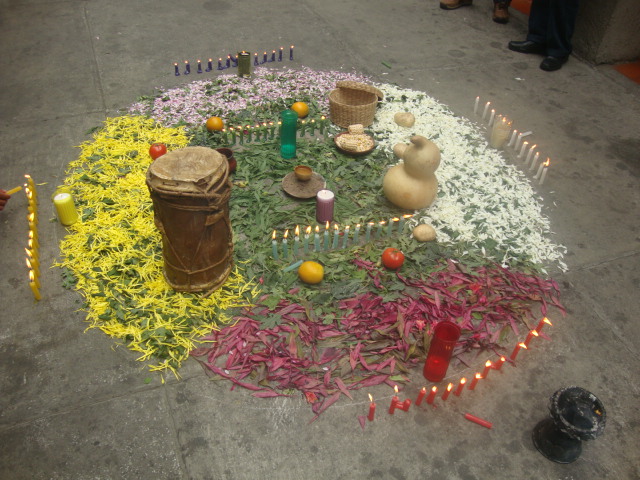
That the Holy Spirit may help us to discern the will of God for our pastoral ministry and to be always witness of cooperation and communion. Lord hear us.

That the Holy Spirit may help us to discern the will of God for our pastoral ministry and to be always witness of cooperation and communion. Lord hear us.
«One of the soldiers pierced his side with a spear
and immediately blood and water flowed out»
(Jn 19, 34)
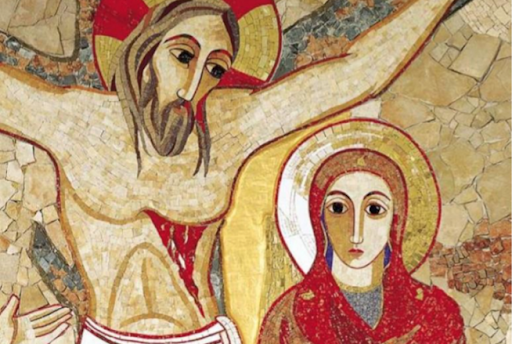
Dear Confreres,
Fraternal greetings in the Heart of Jesus.
This year, the celebration of the Solemnity of the Sacred Heart of Jesus finds us fully engrossed in preparing the next General Chapter, a synodal event that gives us the opportunity to grow in fidelity to the chrism and so to incarnate it in the particular mission of this historic moment. This time is marked by the pandemic caused by the COVID which has been a shock at all levels, by conflicts and wars in different parts of the world and by tensions in some local Churches.
Our Rule of Life reminds us: «The Founder discovered in the mystery of the Heart of Jesus the thrust of his missionary commitment. Comboni’s unconditional love for the peoples of Africa had its origin and model in the saving love of the Good Shepherd who offered his life on the Cross for humanity » (RL 3).
The Heart of Jesus is for us the anchor that keeps us joined to the source of life and the mission; it is the sap that gives life to our Institute; it is, without doubt, a fundamental element of the charism which helps us to re-qualify and renew our commitment. The Comboni mission, 154 years after the foundation of the Institute, continues in time and space, enriching us with shades of meaning that find concrete expression in new ways of being and living the mission. One of these expressions is, without doubt, integral ecology to which we are called to respond with the courage and creativity typical of our Founder.
In this feast, we renew our desire to follow Jesus in his total giving of himself for the salvation of the world and, in all humility, to place our gifts at the service of the Kingdom. We are invited to find in the contemplation of the mystery of the Heart of Jesus the audacity and the energy to set out where the Spirit leads us. Our missionary commitment will bear fruit only if it emanates from an experience of encounter with Jesus and is a living expression of that love which shines from the Cross towards all men and women, especially the most needy.
To celebrate the Heart of Jesus in a pandemic context that has forced us to seek new paths and adapt to the imperatives imposed by a situation that leaves us helpless and has made us suffer and weep for its victims among the Comboni Family, our own families and the people among whom we work, reminds us that we all belong to one interdependent family. To the loss of human lives we must also add the tremendous increase in the loss of employment throughout the world that inevitably leads to poverty. May the extraordinary gestures of solidarity we have witnessed be also signs of hope helping us to build up our humanity so needful of finding new coordinates that will enable all of us to have life in abundance. The blood and water that flow from the side of Christ are the sign that our fragility has as its final horizon the resurrection, and this lights up our work of proclaiming the Gospel of the infinite compassion of God for humanity. As Comboni Missionaries of the Heart of Jesus, let us make this suffering ours and let us renew our commitment in the mission Jesus has given us.
The renewal of our consecration on this Feast Day is an act of trust and an invitation to continue to grow in the vocation the Lord has given us as a gift for all humanity.
We beg the intercession of Holy Mary Our Mother who accompanied her Son at the foot of the cross and that of Saint Daniel Comboni.
We wish you a Happy Feast Day.
Rome, 1 June 2021
The Anniversary of the Founding of the Institute
The General Council
A commentary on Matthew 28, 16-20
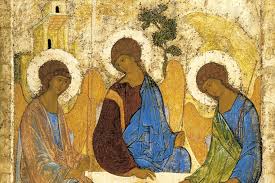
This Sunday dedicated to the Holy Trinity is, somehow, the highest point in our liturgical year. The disciple missionary, who tries to identify himself with Jesus Christ, receives today, in adoration and contemplation, a proposal to approach the mystery of God, a reality that is close to his most intimate identity (S. Agustin), but at the same time overrides every frontier and every human dimension. The Church offers today a reading of the last verses of Matthew’s gospel, where mention is made of the Father, the Son and the Holy Spirit.
Let us reflect a bit on a few concepts that we can find in these last verses of Matthew:
Jesus meets his disciples on a mountain, in Galilee. It may seem an irrelevant geographical note, but I do not think so. In a sense, all of us are marked by geography. At least, on my side, I must say that some mountains have left a definitive mark in my personal life. I remember, for example, the Sinai majestic pics: there I could understand quite easily how Moses and Elia could feel the extraordinary presence of God (Cfr Ex 19, 20; 1 Kings 19, 8); I remember also the fantastic Machu Pichu in Peru, where I had de impression of being at the centre of our Planet and to enter into communion with the ancient Peruvians… In fact, for many religions and cultures mountains are a place of God’s revelation (theophany). And that can be easily understood: mountains help us to come out of ourselves, to overcome routine and superficiality, looking for the highest level of our personal conscience. And it’s precisely there, in the highest level of our conscience, that appears as a presence that cannot be expressed in words, but it’s clearly perceived as very real and authentic.
Jesus, on his side, used to go quite often to the mountain, alone or with the disciples, reaching, as the son of Mary, the highest level of conscience and communion with the Infinite Love; such an experience has become an extraordinary gift also for us, his disciples and brethren. Following his steps, we need also to climb continuously the mountain of our conscience, with the help of a place which invites us to overcome routine, noise and superficiality.
Confronted with Jesus, identified “on the mountain” as the Son of God, the disciples experience a double movement of adoration and doubt. On one side, they feel the need to prostrate themselves and acknowledge the Divine presence in the Master and Friend, because only in adoration we can approach the mystery of God; word do not help and even sometimes they may sound almost like a “blasphemy”, in the sense that no words can contain that reality that one can just glimpse from our deepest conscience. That’s why, together with a sense of joy and adoration, the disciples experience also uneasiness and doubt: they are quite aware that they cannot reach to God and that all or words and concepts are limited and , in a sense, not completely truthful. All our concepts about God are inadequate and must be continuously corrected, with the help of the doubt, which lead us not to “sit” over what we have understood and to be ever open to new insights. God is awaiting us always in front of us on the way of history.
Different people, cultures and religions, “grope about” for the mystery of God, giving Him different names according their own cultural experience. Israel, on his side, decided rather not to pronounce God’s name, because really no human being can “name” God. When somebody gives a name to something or somebody, somehow, he takes possession and manipulates the “named” object. But God cannot be possessed or manipulated. Nor even Jesus gives a name to God; what he does is to reveal his relationship with God as his Father and his Spirit. And He commands his disciple to go to the world and baptize “in the name of the Father, and the Son and the Holy Spirit”. When we are baptized, following this mandate, we do not name God, but we are consecrated to become members of that divine “family”. We –and the whole humanity- are called and consecrated to be in communion with this divine mystery of relationships and love.
The most important religions have reached the idea of a unique God and this is an important step in the history of mankind. But Jesus, from the “mountain” of his human conscience, teaches us that God is unique, but not “single”; not “lonely”, but communitarian. In the same way, we, human beings, created on God’s image, are made to live in communion. None of us is complete; we need to be completed by others before reaching the image of God: Father-Son-Spirit. When somebody denies a member of the community is denying God. To adore God means to welcome Him/Her in the sanctuary of the conscience and, at the same time, in the concrete reality of every human being, in its marvellous singularity and diversity.
Fr. Antonio Villarino,
Bogotá
We share a series of videos recorded by “Casa África” in Spain. An initiative of this institution that aims to be a tribute to all those who made Africa the center of their lives.
“Many Spaniards have lived most of their lives in, by and for Africa. Given the advanced age of many of them, the memory of their experiences could be lost. That is why the Memory Project was born, with the sole intention of collecting and safeguarding their experiences, their contributions, their personal and professional triumphs and failures, offering a historical and documentary window that allows us to know what Africa was like half a century ago, something that can help us understand its current situation”.
We will recover some of the interviews with Comboni Missionaries.
We will recover some of the interviews with Comboni Missionaries. We begin this series with the interview of Comboni Bishop Jesús Ruiz who for so long has worked and continues to work with the CLM (now Bishop in Central African Republic in the diocese of our international community of Mongoumba). [Video in Spanish]

Dear Friends. Dear Sisters and Brothers,
This year I am enjoying a tremendous experience of “Transformation” here in Castel D’Azzano, Italy. The reason is, that I have the opportunity of accompanying the transformation of nature from winter to spring, to autumn and to summer. You cannot imagine how is in Europe the difference between Winter, Spring, Summer and Autumn.
The sight I had during the last winter, January- February, from my big window and balcony, was the sight of skeletons, because all the trees around, which are many, were naked like bones without flesh and skin. You could think of death creatures, of death trees. But after a while: New life came. Magnificent. In the garden, the death dark grass and bushes, started to show a striking diversity of all possible hue pigments of green. And it was marvellous to see the gently transformation of the trees from nakedness to the “multi-coloured bright sight” wrapped up in lovely flowers and leaves. The key word of our Movement for Social Transformation is wonderfully reflected in the nature.
Of course, transformation includes all aspects of nature, because, everything is in the process of change and of evolution. The word “social” brings owe to us, to acknowledge that what brings in Europe transformations which occur in nature, are the seasons: Spring, Summer, Autumn and Winter. Four parts of the year deeply different from one another. It is amazing how nature feels then. Each season has unique connotations. Spring: The season of the blossoming, new life, flowers all over and the full grown variety of colours and perfumes surpassing your smell capacity of enjoying creation. Beyond that the immaginario that many of these flowers will become sweet fruits. Summer is the season of the gradual ripening and maturing of everything. Very charming also how I caught sight of the herds of sheep looking for their pasture. Once I was in the middle of the herd, among them. Beautiful. Autumn is harvesting time, the leaves change colours which are also enchanting, and then fall down leaving a soft carpet on the soil. At that time all fruits are ripe. After that, comes the cold winter, snow and dew. Winter is the time for nature to resting, after harvesting time. It seems for nature to be in “life stop”, to be suffering only, but it is not so. There dwells its golden chance for its hidden intrinsic power to be regenerated for a new circle of life.
It is astonishing to realize how the contemplation of nature while accompanying the four different seasons, is a source of immense wisdom. It is important to transfer the seasons of nature, to the seasons of human life, to live them with delight, but also to assent to the inevitable painful transformations which do occur in our own lives. Without the ongoing changing of seasons nature should be truly death. The nature shows us, how we should be ready for changes and transformations, though at times full of mystery, hurting, painful and maybe sore, like during this Coronavirus time.
Now that we are near to the Celebration of the coming of the Holy Spirit, let us reflect and link transformations to the presence and action of the Holy Spirit, the true “Transformer”, in our lives as Social Ministers, Social transformers, Social entrepreneurs.
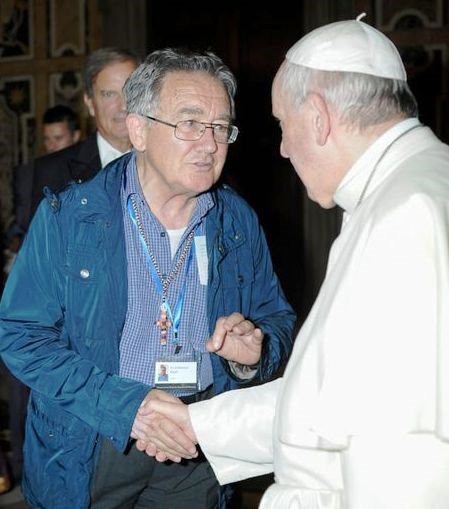
The mystery of the event of transformations which occur in Jesus first and of most, because he became a human being and shared our human life, in many aspects from the conception in the womb of a woman, than in the life of the village and in the workshop of his father Joseph. And of course, his gradual human development whereby he like all of us went on. That was departing from his parents. By detaching himself from his village. So we do. In order to asset our own personal lives according to our own strength, our capacities, to our limits or potentialities. According to the Plan, God has for each one of us.
The beautiful for us is, to strongly believe that our lives are far more than a realization of a human project, all whose objectives are not only the personal good of each one of us, but first of all seen also as humanity as a whole, and of the cosmos as such. It is very important for us to have this very wide vision of all of us. Our life is never a private enterprise for the sake of the individual, but it has a community dimension and a cosmic dimension. It means that our own personal growth and holiness affects positively whatever exists because, none of us is an individual isolated from the others.
Each one of us has a big contribution to give to a cosmic plan, which boundaries and beauty will be partially discover only at the end of our personal life and globally perceived at the end of time when the cosmos will have the final connotation God the Father gives through the dynamism of the Holy Spirit when everything will be recapitulated in Christ at the Omega Point. Let us be aware of this Presence of the Holy Spirit. Let us be open to his action in us. He will be continuously transforming us, until through his light, love and action, we reach the stage of the world becoming truly the Kingdom of God our Father “Abba”.
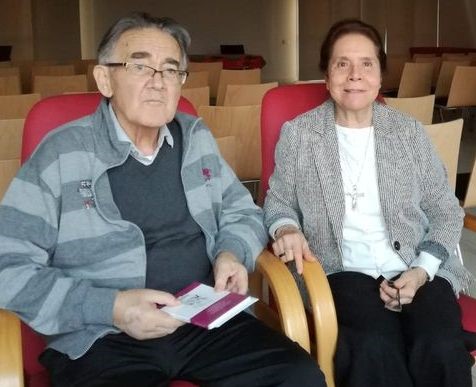
I invite you cordially and respectfully to keep up to our mind-set, to the vision and mission we meant some time ago, and to build up our “Social Transformation Movement”. Born and blossoming with you in Africa, in Nairobi, it started to be spread to all Continents. I can see how from your riches, from your talents, from your creativity, from your culture you are exporting quality to the world. That is what I and Sister Teresita here now willingly call “The New Face of Africa”. Keep always the “team spirit”. “Togetherness” is the secret of your success: To be and act “like true brothers and sisters”, transforming society, each one and each “team” in the place and in the community in the area, in the country, in which everyone lives and works. Please, keep in touch, networking with each other and with me, with us. Thank you!
Golden Sequence: Come, Holy Spirit, send forth the heavenly ray of your light. Come, father of the poor, come, giver of gifts, come, light of hearts. Greatest comforter, sweet guest of the soul, sweet consolation. In labour rest, in heat, temperateness, in tears, solace. Heal that which is wounded. O most blessed light, fill the inmost heart of your faithful.
“Come Holy Spirit, strengthen our new born “Movement for Social Transformation”, strengthen our hearts and minds”. “Give us your heavenly grace to never give up”.
I and Sister Teresita wholeheartedly support you. Greetings and blessings, fraternally yours in Christ.
Prof. Fr. Francesco Pierli MCCJ
P.S. The title of my “Book of the Founder” is “AFRICA: THE CRADLE OF SOCIAL TRANSFORMATION” One subtitle is “NOT NEGOTIABLE EVENT”.